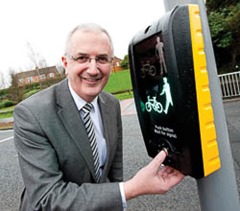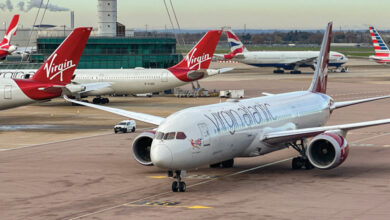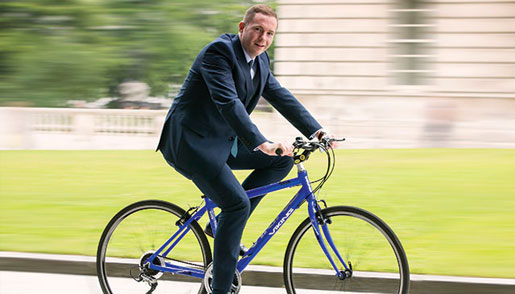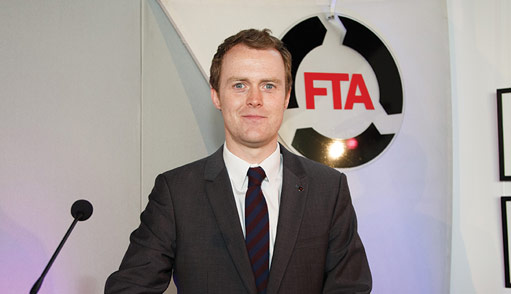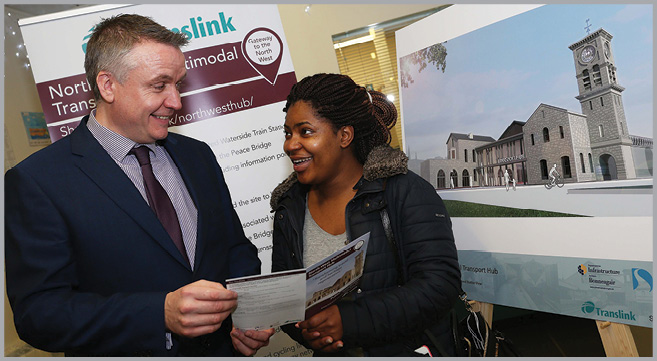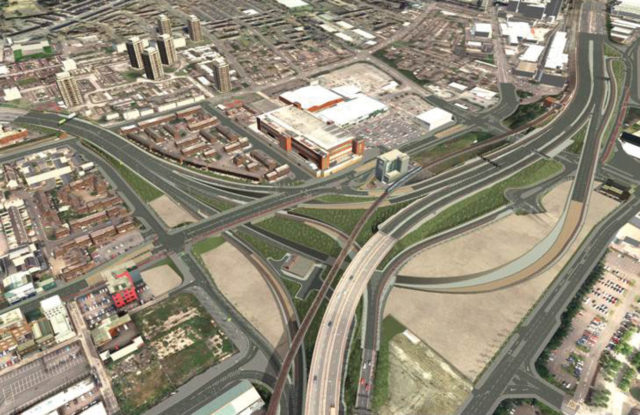Driving forward a culture change
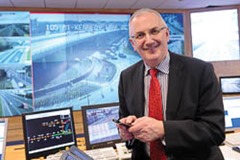 Regional Development Minister Danny Kennedy talks to Peter Cheney about his aims for changing the culture of transport.
Regional Development Minister Danny Kennedy talks to Peter Cheney about his aims for changing the culture of transport.
Danny Kennedy’s ambitions for transport in Northern Ireland are partly drawn from the successes of other parts of Europe which have transformed how their citizens move and commute. He cites Copenhagen – where a third of residents cycle to work – as an example to follow.
“It’s not just a matter of top quality public transport,” he comments. “It’s also a matter of lifestyle and improving the opportunities there are for more sustainable modes of transport to be used, either through walking or cycling.”
Kennedy is continuing to bring forward strategic roads schemes e.g. the A8 between Belfast and Larne, the Magherafelt by-pass, and the A26 improvement at the Frosses outside Ballymena. The next wave of schemes will be largely EU-funded and he has focused on drawing down as much finance as possible. This could, for example, deliver the southern relief road in Newry, the A6 dual carriageway in County Londonderry and the York Street interchange in Belfast. Ideally, the projects would be delivered in the next Budget period although he acknowledges that road-building is a lengthy process.
The Belfast Transport Hub at Great Victoria Street is a project that clearly excites the Minister. It will “transform that area of Belfast” by increasing its retail and commercial footprint. The site, he points out, links right back towards the Sandy Row and its development would offer skills and training opportunities for local people. Ministers are “conscious of the benefits it could bring” and £2.8 million of European funding has been allocated.
The hub would revitalise rail and bus transport in Belfast and also connect with Belfast Rapid Transit, where the east-west route will start running in 2017: “The ambition is that we extend that to all parts of Belfast.”
Culture change
The department was to hold a major conference on cycling on the day after the interview and, alongside Belfast City Council, hoped to roll out a cycle rental scheme in the city from early 2015.
A draft cycling strategy closes for consultation on 21 November.
Cycling, it is put to him, lends itself to large urban centres. He recognises the “huge challenge” of extending “the cycling revolution” in Belfast to towns and other areas and accepts that the infrastructure is weak in many cases. Kennedy adds: “It’s taken Copenhagen the best part of 30 years to become ‘top of the market’ between themselves and Amsterdam. That’s the ambition that we have and we don’t want to put a ceiling on that.”
His approach, the Minister emphasises, is not a “war on the motorist”. Instead, he wants to find a balance between improving the road network – “as we can, as we can afford to, where it’s sensible to do so” – and also improving public transport. Rail passenger numbers are now at their highest level since 1967 and the usage of Metro services is also increasing.
The department’s public consultation on the future of railway investment – between January and April last year – established that there was public support for expanding the network, perhaps in the absence of new road projects in certain areas.
“Huge damage was done to the rail network in the early 60s and to try and recover from that is not an easy situation,” Kennedy adds. His intention is to “reconnect people by using rail” over the next 30 years.
The decision to close the West’s railways was taken in 1965 by Minister of Development William Craig, at a time when passengers were quickly turning into motorists. Craig, it is put to him, could not have foreseen a reversal of that trend and it is a challenge to think in a long-term way. “We’ve got to look beyond even the next five to 10 years,” Kennedy states. “The car and road usage through the 60s became very much the dominant thing. I think people are now more discernible about things like that. They’re more interested in sustainable modes – and cheaper modes – of transport.”
For example, they no longer want to sit in “bumper-to-bumper traffic congestion” for part of the day and many of them have seen how transport is delivered differently when travelling elsewhere in Europe. The case for a culture change is “an argument that we’re winning.”
At a time of financial constraint, the Executive is continuing with ‘free’ policies such as concessionary public transport fares for older people.
The scheme currently costs around £6 million per year.
“I’m a very strong supporter of the scheme for what it does,” he says in its defence. “Yes, it costs money but it also gives senior citizens, particularly, the opportunity to travel and when they travel, I think there’s a social engagement that they enjoy and there’s also a benefit to retail.”
Kennedy affirms: “It’s not all ‘give’ on behalf of the department or the Executive. There is a wider benefit to this.” Keeping people active and in each other’s company also helps with the health budget. The benefits have been “considerable” and he is “determined to fight to retain it.”
One of the tangible signs of the financial deadlock at Stormont has been a delay in fixing streetlights. The department’s response when faults are reported is that the lights will be fixed but it’s not possible at present due to budget pressures. A broken streetlight or a desire to travel, using the SmartPass scheme, can be seen as “competing priorities” depending on the individual. The Minister is keen to stress that he is not “abandoning” street lighting and they will be fixed when the money becomes available.
The Treasury has suggested financial transactions capital (FTC) as an alternative funding route and DRD is discussing this with the Department of Finance and Personnel (DFP). Financial transactions consist of the transformation of one type of financial instrument into another – and include loans and share capital acquired to further a department’s policies.
“Clearly, we are interested in output,” Kennedy explains. “These are straitened times. In the budgetary period moving forward, projections are not good, predictions are even worse.” It’s a matter of making the best use of the resources given to the department and also those which can potentially be “made available” through FTC and other options.
The Minister also sees potential in project bonds, especially where projects can be clustered to mutualise the risk and enhance creditworthiness. Loan guarantee instruments have partially funded the £6.2 million Tours-Bordeaux rail project in France and may also be used for HS2 and Crossrail.
A Barnett consequential from HS2 – potentially worth up to £1.5 billion – could also help to close the infrastructure gap between Britain and Northern Ireland.
The Department for Regional Development has drawn down £53 million from Europe since 2011 – the best performance in the Executive. The funding goes into a central pot held by DFP but the Minister and his officials want to see that spent on infrastructure: “We would argue that we should be rewarded for good performance.”
He points out that the cancellation of the Narrow Water bridge project released funding – from the Peace III programme – to upgrade the Enterprise rail link between Belfast and Dublin.
“It’s not that we’re idle or we’re complacent to allow money that’s potentially out there to be sent back to Europe,” Kennedy concludes. “That’s not in anybody’s interest. The important thing is that we utilise every opportunity.”
Kennedy is sometimes frustrated when he is described as Roads Minister or Transport Minister rather than his official title.
Regional development also covers water infrastructure, where further improvement is required to meet European standards. The Executive has a ‘no water charges’ policy for this Assembly term but a ministerial sub-committee is looking at “alternative options” in the longer term.
The department sees water and transport infrastructure as twin enablers for economic growth – as both are needed by businesses. The Regional Development Strategy is based on connections being built up between towns and cities, and reflects a settlement pattern that is unique within the UK.
Speaking at the Northern Ireland Economic Conference, he defined regional development as “a product of collective ambition and collaborative thinking” which was about job creation and reducing disparities. This fitted into a broader European vision of “breaking down barriers and dividing lines.”


